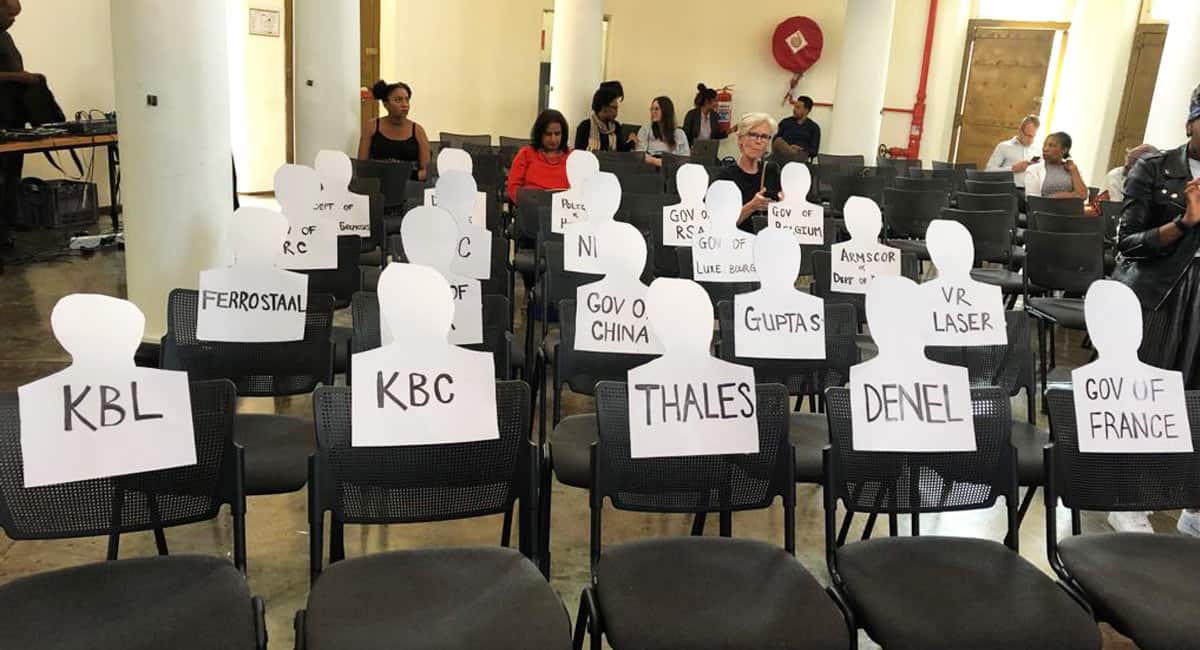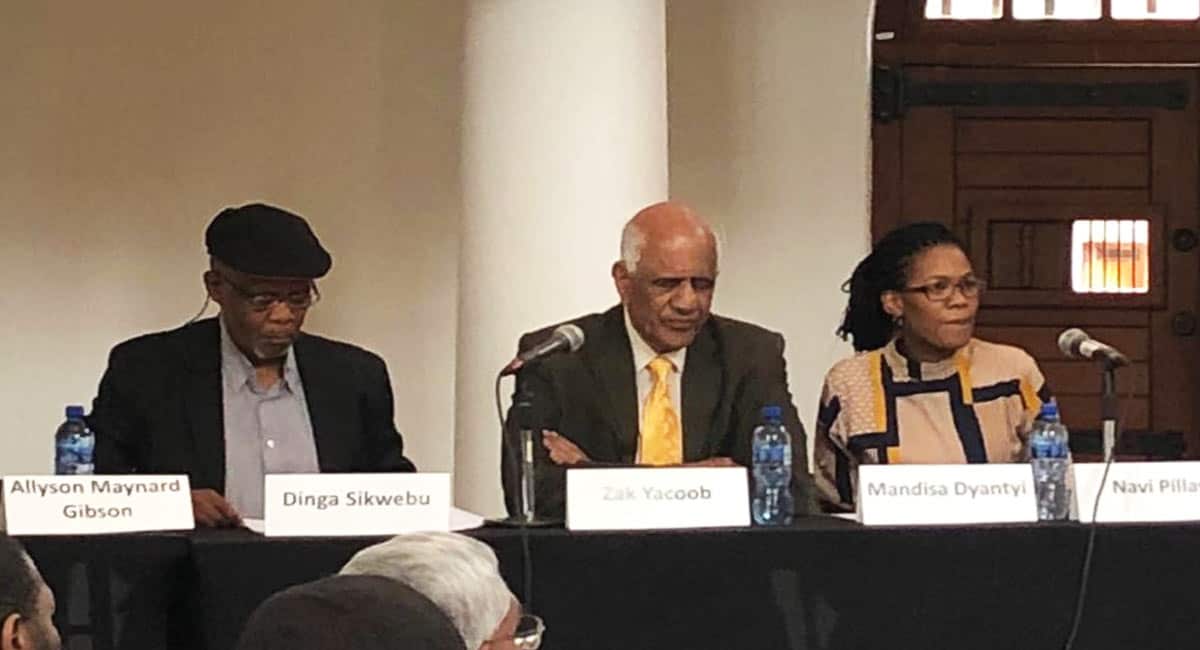Today the People’s Tribunal on Economic Crime delivered its final findings to the public during an event at Johannesburg’s Constitution Hill. The tribunal sat earlier this year with the intention of focusing on three periods in South Africa’s history – the apartheid years, the 1999 arms deal, and state capture. Once the interim report was complete, the 38 implicated parties were given three months in which to respond to allegations made against them – just one responded meaningfully, however.
Also during this time, legal arguments were prepared for deliberation by members of the tribunal panel.
The panel comprised legal experts and activists – Allyson Maynard Gibson QC, retired justice Zak Yacoob, Mandisa Dyantyi, retired judge Navi Pillay, and Dinga Sikwebu. Each of them has made an invaluable contribution to social justice, in their own different ways.
Corruption Watch, with Open Secrets, Right2Know Campaign, Centre for Applied Legal Studies (CALS), Public Affairs Research Institute (PARI), and the Foundation for Human Rights, was part of the organising committee.
Evidence of economic crimes
Initial hearings took place from 3 to 7 February 2018. Evidence of corruption and economic crimes relating to the South African arms trade over the past forty years was heard. In addition, civil society groups made powerful submissions about the impact of corruption in our society.
After considering the critical and compelling evidence brought before them, the panel made interim findings and recommendations, indicating that they had heard significant and damning evidence of alleged wrongdoing in each of the cases brought forward. These interim findings were not substantially changed in the final report.
In terms of the first focus area, arms trade during apartheid, Justice Yacoob pointed out that it was a crime to trade arms with apartheid South Africa under the UN arms embargo, and that anyone trading arms with the country at the time was doing so knowingly.
Sadly, even those posturing as allies to the struggle against apartheid were found to have been propping up the evil apartheid regime. The continued arms trade with apartheid South Africa was equally evil, as support of the apartheid government enabled the ongoing forced removals, illegal imprisonments, and murders that occurred at that time.
The panel reiterated that there has been a “terrible failure” by the state to prosecute those that aided and abetted the apartheid regime, and added that the process started by the Truth and Reconciliation Commission (TRC) would be incomplete until investigations and prosecutions have taken place against those who were complicit, did not testify, or did not make full disclosure.
The panel recommended that a special investigations and prosecuting team be set up with the National Prosecuting Authority (NPA), by the incumbent national director of public prosecutions together with the minister of justice, to focus on complicity by various state and non-state actors in the crime of apartheid. This unit would follow up on TRC work, and report to Parliament every six months on progress, timeframes, and possible proceedings. It should complete in two years.
Justice Yacoob stated that in the panel’s view, there was enough evidence to warrant “at least a thorough investigation” into certain entities, including the French government and Kredietbank – the only implicated party to respond meaningfully. The bank had indicated that no records had been found – but there was no denial. Indeed, none of the implicated parties denied what had been said about them.
The report also called for a governmental body to be established to make recommendations to Parliament on a commission of inquiry into crimes against humanity and human rights violations, with a tribunal to prosecute where necessary.
The report should be shared with all TRC commissioners as well as the UN.
Impunity leads to more impunity
Moving on to the second focus area, the 1999 arms deal, the panel dealt cautiously with this matter, because the findings and recommendations of the Seriti Commission of Inquiry into the arms deal are still under review, in an application brought by Corruption Watch and Right2Know.
However, the panel found it odd that only former president Jacob Zuma is being prosecuted for his part in the shady dealings, when others were involved.
It was unlikely the arms deal would have happened had authorities investigated those who broke sanctions against South Africa during the apartheid years, said Justice Yacoob. “The fact that [the ANC and the government] have not responded [to serious allegations in the interim report], in our view, increases the need for a full and proper investigation by the independent National Prosecuting Authority as well as the South African Police Service.”
The NPA and police should investigate “each and every transaction conducted by or on behalf of the South African government of the time, or any other party, in relation to the arms deal”.
South Africa probably did not need the equipment bought for billions of rands in the arms deal, said Yacoob – rather, it was for the money-making benefit of corrupt persons. “The stated purpose [of needing military arms, and offsets to benefit poor South Africans] could never have been the real purpose.”
State capture related to arms deal and apartheid
Finally, the panel addressed state capture, noting that it would be a mistake to examine this matter in isolation by not taking the illegal apartheid arms trade and the 1999 arms deal into account. Each one paved the way for the next crime, and they are “integrally related”. “Absent the violation of UN sanctions, and the corrupt arms procurement package, the kind of state capture described in the evidence would probably not have occurred.”
The panel recommended that the evidence and testimonies brought before the tribunal should be made available to the Zondo Commission into state capture, now sitting in Johannesburg. Also, the NPA and police should, as a matter of urgency and without waiting for the Zondo Commission to conclude, investigate state capture allegations, considering the evidence before the Zondo Commission.
The panel has seen “persuasive circumstantial evidence” that state-owned enterprises such as Denel were manipulated so that they did not perform their functions as they should have, but operated rather to benefit private actors – naming the Gupta family specifically.
Bishop Malusi Mpumlwana, general secretary of the South African Council of Churches, delivered the closing address, saying that the People’s Tribunal has “shown the potholes on the road to a better South Africa”. He thanked the panel for helping to open the eyes of the nation.
“Some may ask why we look at the past,” he said, “but without the past we cannot move forward.”
The panel
 Retired judge Navanethem Pillay (@Navi_Pillay), former UN High Commissioner for Human Rights.
Retired judge Navanethem Pillay (@Navi_Pillay), former UN High Commissioner for Human Rights.
 Dinga Sikwebu, a labour rights activist and the co-director of @Tshisimani.
Dinga Sikwebu, a labour rights activist and the co-director of @Tshisimani.
 Mandisa Dyantyi, deputy general secretary of the Social Justice Coalition (@sjcoalition).
Mandisa Dyantyi, deputy general secretary of the Social Justice Coalition (@sjcoalition).
 Former Constitutional Court Justice Zak Yacoob (@zakyacoob), an anti-apartheid activist.
Former Constitutional Court Justice Zak Yacoob (@zakyacoob), an anti-apartheid activist.






